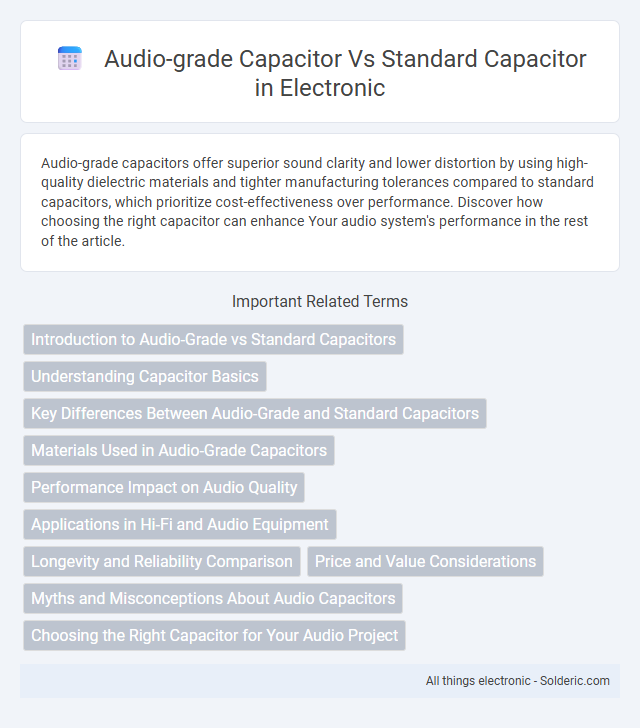Audio-grade capacitors offer superior sound clarity and lower distortion by using high-quality dielectric materials and tighter manufacturing tolerances compared to standard capacitors, which prioritize cost-effectiveness over performance. Discover how choosing the right capacitor can enhance Your audio system's performance in the rest of the article.
Comparison Table
| Feature | Audio-Grade Capacitor | Standard Capacitor |
|---|---|---|
| Purpose | Designed for high-fidelity audio circuits | General electrical applications |
| Material | High-quality film, foil, or specialized dielectrics | Common ceramic, electrolytic, or film materials |
| Tolerance | Lower tolerance, typically +-1% to +-5% | Wider tolerance, typically +-10% to +-20% |
| ESR (Equivalent Series Resistance) | Very low ESR for minimal signal loss | Higher ESR, affecting performance in sensitive circuits |
| Noise | Minimal microphonic and electrical noise | Higher inherent noise and microphonics possible |
| Frequency Response | Optimized for broad and flat audio frequency response | General frequency response, not audio optimized |
| Cost | Significantly higher cost due to quality materials and manufacturing | Cost-effective for general use |
| Applications | Audio crossovers, amplifiers, high-end audio gear | Power supplies, timers, general electronics |
Introduction to Audio-Grade vs Standard Capacitors
Audio-grade capacitors are specifically designed with superior materials and tighter tolerances to provide enhanced audio signal clarity and reduced distortion compared to standard capacitors. Standard capacitors typically prioritize cost-efficiency and basic performance, often leading to higher dielectric absorption and increased signal noise. The specialized construction of audio-grade capacitors ensures improved frequency response and durability, making them ideal for high-fidelity sound applications.
Understanding Capacitor Basics
Audio-grade capacitors use specialized dielectric materials and tighter manufacturing tolerances to minimize distortion, noise, and signal loss compared to standard capacitors. These capacitors typically feature lower equivalent series resistance (ESR) and improved frequency response, making them ideal for high-fidelity audio circuits. Understanding capacitor basics involves recognizing how capacitance, voltage rating, and ESR impact audio signal integrity and overall sound quality.
Key Differences Between Audio-Grade and Standard Capacitors
Audio-grade capacitors are specifically designed to minimize electrical noise, distortion, and signal loss, enhancing audio fidelity compared to standard capacitors. They utilize high-quality dielectric materials, tighter tolerances, and specialized construction to preserve sound clarity and dynamic range. Standard capacitors prioritize general electrical performance and cost-efficiency, often resulting in higher Equivalent Series Resistance (ESR) and inductance, which can degrade audio signal quality.
Materials Used in Audio-Grade Capacitors
Audio-grade capacitors utilize high-purity polypropylene film or polyphenylene sulfide dielectric materials known for their low dissipation factor and superior electrical stability, which significantly reduce signal distortion and noise in audio applications. These capacitors often feature metalized films with gold or silver electrodes to enhance conductivity and minimize contact resistance, ensuring high-fidelity audio reproduction. In contrast, standard capacitors typically use electrolytic or lower-grade ceramic dielectrics that exhibit higher equivalent series resistance (ESR) and more dielectric absorption, negatively impacting audio clarity and precision.
Performance Impact on Audio Quality
Audio-grade capacitors significantly enhance audio quality by providing lower Equivalent Series Resistance (ESR) and tighter tolerance, resulting in cleaner signal transmission and reduced distortion. Their superior dielectric materials and construction minimize noise and preserve signal integrity, delivering clearer highs and richer lows compared to standard capacitors. Standard capacitors tend to introduce subtle signal degradation and electrical noise, potentially muddying the sound and diminishing overall audio fidelity.
Applications in Hi-Fi and Audio Equipment
Audio-grade capacitors are specifically designed to enhance sound quality by minimizing distortion and preserving signal integrity in Hi-Fi and audio equipment, unlike standard capacitors which may introduce noise or coloration. Their superior materials and tighter tolerances ensure clearer highs, richer mids, and deeper bass, making them essential for audiophiles seeking optimal performance. When upgrading Your audio system, choosing audio-grade capacitors can lead to noticeably improved listening experiences and greater fidelity.
Longevity and Reliability Comparison
Audio-grade capacitors typically feature superior materials and tighter manufacturing tolerances, resulting in enhanced longevity and reliability compared to standard capacitors. These capacitors often use high-purity electrolytes and low-loss dielectric materials that minimize degradation and maintain consistent performance over extended periods. Standard capacitors may experience faster aging and increased parameter drift under similar operating conditions, leading to reduced lifespan and potential failure in audio applications.
Price and Value Considerations
Audio-grade capacitors typically command a higher price due to specialized materials and manufacturing processes aimed at enhancing sound quality. Standard capacitors offer more affordability but may lack the nuanced performance sought by audiophiles, resulting in a lower value proposition for high-fidelity applications. Investing in audio-grade capacitors can provide measurable sonic improvements that justify the cost for enthusiasts seeking premium audio reproduction.
Myths and Misconceptions About Audio Capacitors
Audio-grade capacitors are often surrounded by myths claiming superior sound quality due to specialized materials or construction; however, many tests reveal these differences are minimal or inaudible compared to standard capacitors. Misconceptions include exaggerated claims about longevity, noise reduction, and tonal enhancement that are not consistently supported by technical measurements or blind listening tests. Genuine improvements in audio performance typically depend more on circuit design and quality control than on the capacitor type alone.
Choosing the Right Capacitor for Your Audio Project
Audio-grade capacitors offer superior dielectric materials and tighter tolerances compared to standard capacitors, resulting in clearer sound reproduction and reduced signal distortion in your audio project. These capacitors minimize noise and preserve audio fidelity by maintaining stable capacitance under varying temperatures and frequencies. Selecting an audio-grade capacitor ensures enhanced performance and reliability, particularly in high-fidelity and professional audio applications, where sound quality is paramount.
audio-grade capacitor vs standard capacitor Infographic

 solderic.com
solderic.com